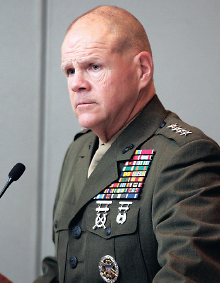Marine Corps Commandant Seeks Cooperation From U.S. Psychiatry
Abstract
Civilian or military, American psychiatrists can help ease the transition home for U.S. Marines and fellow service members.
Gen. Robert Neller, the commandant of the U.S. Marine Corps, came to APA’s 2016 Annual Meeting in Atlanta with the same request he makes of all his Marines—to recognize when you need help and ask for it.

The commandant of the U.S. Marine Corps, Gen. Robert Neller, tells Annual Meeting attendees about the mental health needs of his Marines, especially after leaving active duty.
The Marine Corps trains its recruits to be tough, resilient, and adaptable in overcoming obstacles, and, most of all, to be members of a team, he told a large audience. When something happens, that sense of cohesion usually sustains them. But not always. Sometimes that culture works against them.
Talking about their internal stresses or anxieties doesn’t come easy for Marines, but it’s essential. Neller was especially concerned about suicides among current and former members of the Marine Corps. Surviving battle may be a risk factor, but the majority of Marines who die by suicide never saw combat, he said.
Robert Ursano, M.D., is a principal investigator on the Army Study to Assess Risk and Resilience in Servicemembers (STARRS) and spoke in the same session with Neller.
“Historically, military suicide rates were half that of the nation as a whole, but in the last 10 years, they rose above civilian levels,” noted Ursano, a professor and chair of psychiatry at the Uniformed Services University of the Health Sciences in Bethesda, Md.
“We know for sure that being deployed is not the full answer,” he said. “However, half the soldiers coming into the Army today have had a traumatic brain injury [TBI]. That is not surprising considering the high prevalence of TBI in the nation.”
Superficially, there may seem to be a continuum from suicide ideation to planning to attempts to completed suicide, but these may be different disorders, he suggested.
“Most people with suicidal ideation have depression, but severity of depression does not predict suicide,” he said. “It does predict the presence of an anxiety disorder. So when trying to predict suicide, look at anxiety.”
How can civilian psychiatrists help?
“Ask all your patients if they have served in the military,” said Ursano. “Screen for any life-threatening events. There’s a 12-year gap between the onset of PTSD and diagnosis. The military is pushing that to months, and civilians can do the same.”
Too often, outside clinicians don’t ask their patients about prior military service, agreed Harold Kudler, M.D., chief consultant for mental health at the VA.
“If they are not asked, vets think you don’t care,” he said. “If you don’t ask, you won’t know what you need to know to care for them.”
There are 22 million U.S. veterans, but only 9 million receive care in the VA health system, said Kudler. “The vast majority of vets don’t use the VA.”
Men and women with prior military service don’t appear to be different from other patients. “These people aren’t visible, but they deserve to be visible.”
Kudler offered additional suggestions for practitioners who are unfamiliar with treating former or current service members.
“The best way to show that you care is to listen and ask questions when you don’t understand something,” he said. “Ask when they served—it makes a difference—and what their military occupational specialty was,” he said. “Ask if their military experience affected their physical or mental health, their family life, or their work."
Beyond those suggestions, the VA can offer concrete assistance to civilian clinicians, said Kudler. VA facilities can provide technical services like brain scans, free PTSD consultations, a pocket card to guide the conversation, and a community provider toolkit.
Like Kudler, he urged psychiatrists and other mental health clinicians to help out wherever they live. More than 30,000 Marines complete their service and return home each year. Most will receive their health care in their home communities, so all practitioners should routinely ask their patients if they have ever served in the military. That can open a door to a critical part of a patient’s life, one that doesn’t end on the day the person stepped out of uniform, said Neller.
“We as leaders say to anyone who has served in the military: Your team needs you, your family needs you, your country needs you,” he said. “So if you’re struggling, tell someone, and that someone is obligated to get you help. The only way to solve anything is to talk about it.
“We need your help,” Neller told APA members. “Come and look at our programs. Help us build greater resiliency. Learn about our culture.”
“Someone once said that the military is a part of and apart from our nation,” concluded Ursano. “Gen. Neller is a leader and he asked us for help—one of the hardest things to do. Now we need to develop ways in primary care to aid people in learning how to ask for help.” ■



